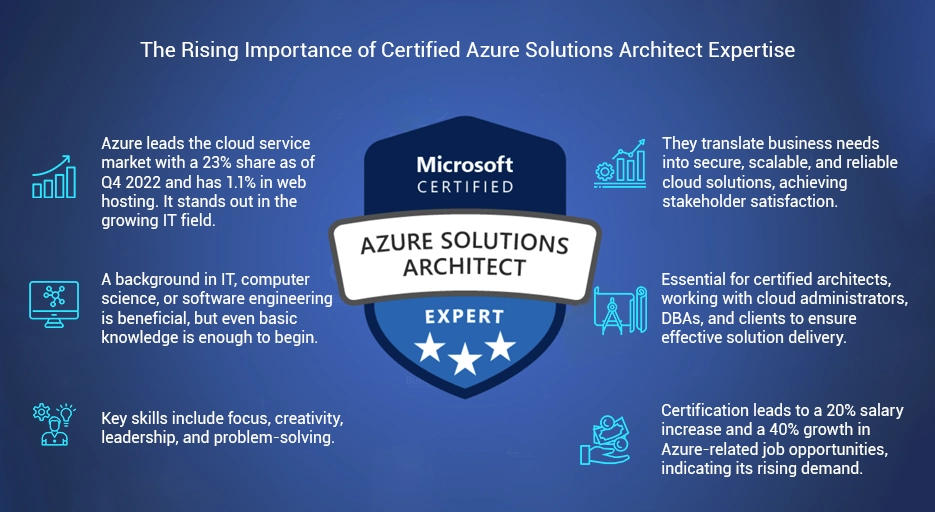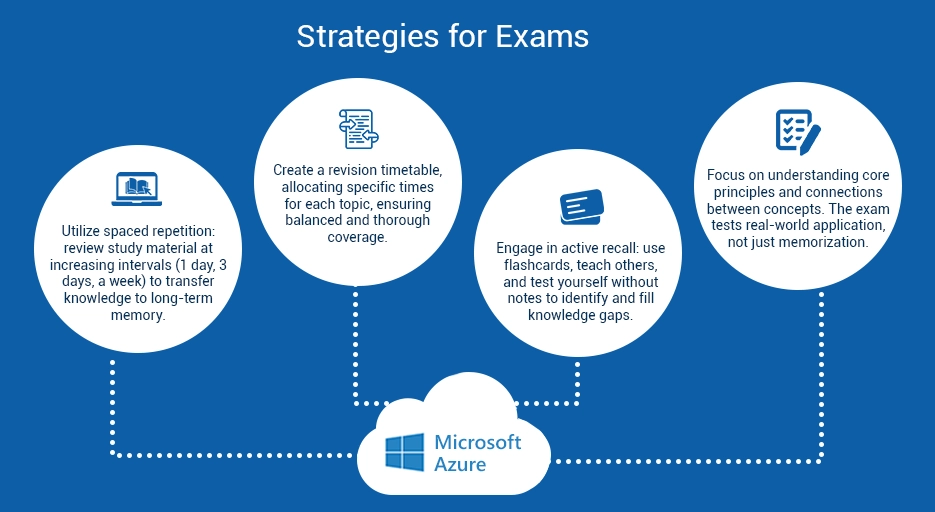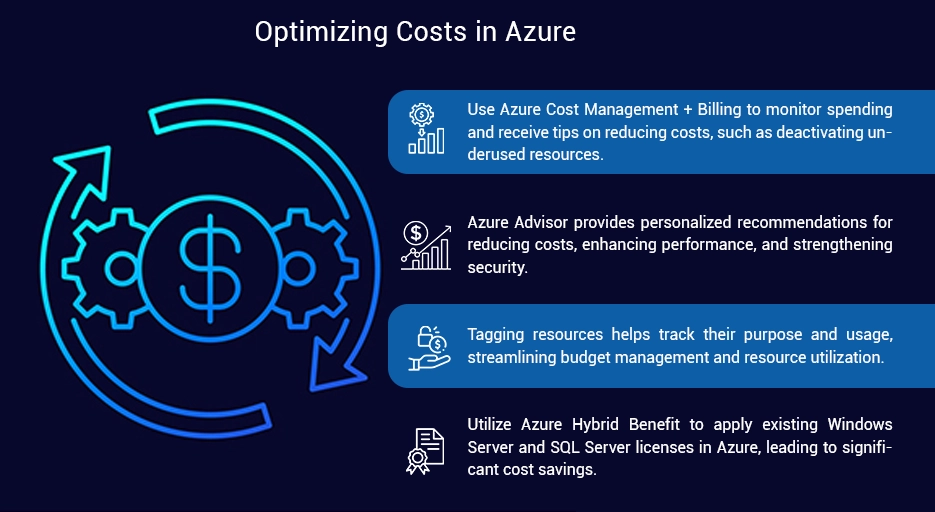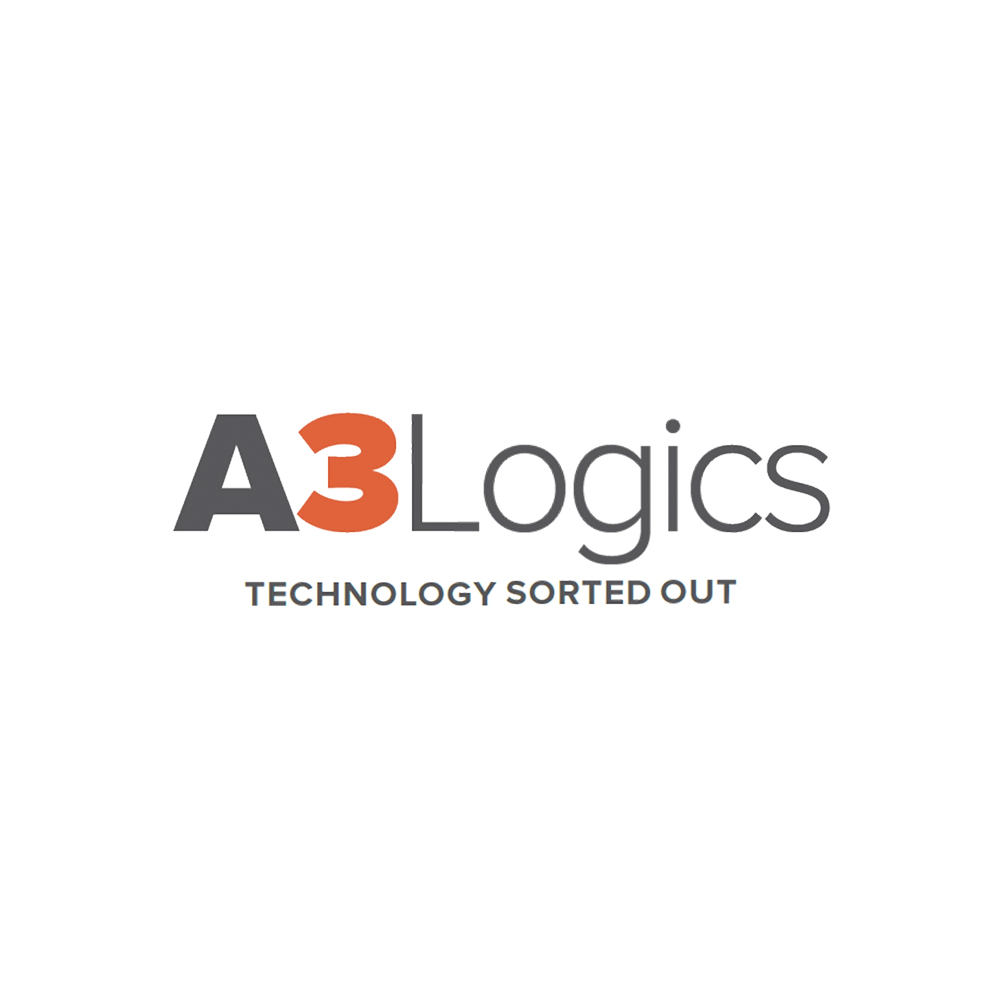Certified Azure Solutions Architect expertise is increasingly vital in the IT sector. This esteemed certification usually requires an IT, computer science, or software engineering background. While previous experience is not compulsory, understanding the basics helps grasp the concepts. In the fourth quarter of 2022, Microsoft Azure captured 23% of the cloud services market, as per AAG, making it the world’s second-largest cloud service at the beginning of 2023. Microsoft Azure, a top cloud platform, also has a 1.1% share in the web hosting sector.
For this certification, individuals need focus, creativity, leadership, and problem-solving abilities. These skills are crucial for dealing with the complexities of Azure solutions.
Azure consultants are also key players. They convert business needs into secure, scalable, and reliable cloud solutions. This ensures that stakeholder requirements are met with expertise.
Teamwork is important. Certified Azure Solutions Architects collaborate with Microsoft cloud administrators, DBAs, and clients. This collaboration is essential for the smooth delivery of solutions.
Earning the Microsoft Azure certification does more than improve skills; it advances careers. A recent survey shows certified individuals often see a 20% salary increase. Microsoft notes that over 90% of Fortune 500 companies use Azure services. This shows the high demand for skilled experts. Job listings asking for Azure certification have risen by 40% in the past year, indicating a growing market need for such skills.

A. Becoming a Microsoft Certified Professional
In every industry, Microsoft offers role-based certifications. You can become Microsoft Certified by passing two tests linked to the Architect role: Expert in Azure Solutions Architecture:
- Exam AZ-303: Microsoft Azure Architect Technologies
- Exam AZ-304: Microsoft Azure Architect Design
However, according to Microsoft, you must meet specific requirements to apply for this exam. Let us try to comprehend them.
Solution Architect for Microsoft Azure
To plan and deploy Microsoft Azure solutions that involve computing, network, storage, and security, you must have the skills and knowledge required.
Second, to administer Azure, you must have a basic understanding of the platform.
Finally, you’ll need a solid understanding of Azure development and DevOps procedures.
Then there are a variety of IT activities with which you must be well-versed at an advanced level, such as
- Identity, networking, and virtualization
- Security
- Continuity of operations
- Recovering from a disaster
- Platform for data
- Budgeting and governance are two topics that come up frequently.
Finally, extensive Azure administration skills and familiarity with Azure development and DevOps procedures are necessary.
AZ-303 Exam Preparation:
- The AZ-303 test verifies your understanding of duties such as:
- The first step is to set up and monitor an Azure infrastructure.
- Second, management and security solutions get implemented.
- Finally, solutions for apps are implemented.
- Finally, data platforms must be applied and controlled.
AZ-304 Exam Preparation:
- The AZ-304 test verifies your understanding of duties such as:
- To begin, create a monitoring system.
- Second, identity and security preparation.
- Designing data storage is the third step.
- Finally, create a business continuity and infrastructure plan.
Take Your Cloud Strategy to New Height With Our Azure Services
B. Investigating the research methods
This step is critical since how you prepare for the exam is crucial. Another way, having the proper knowledge, study materials, and references is essential for exam preparation.
Microsoft’s Education Path:
Microsoft provides new methods to comprehend the material. Microsoft got many learning routes for each exam, each covering the exam’s subject in modules. These documents give all pertinent information as well as helpful reference links.
1. Using Azure to design a network infrastructure
Learn how to connect on-premises networks to Azure resources and use Azure to build secure, flexible network infrastructure.
Prerequisites:
- A basic understanding of network concepts such as IP addressing and routing can help things out during learning.
- Network access options, such as VPN, are well-understood.
2. Architecting Azure storage infrastructure
- Learn how to use Azure to architect storage solutions for your applications.
3. Architecting Azure compute infrastructure
- Learn how you use Azure to architect computing infrastructure and solutions for business process automation.
Prerequisites:
- Virtual machines need to be understandable.
- Virtual machines require an understanding of networking and storage fundamentals.
4. Using Azure to design message brokering and serverless applications
- Learn how to create reliable communications for your applications and use Azure’s serverless application services.
Prerequisites:
- C# Knowledge is essential.
5. Using Azure to build modern applications
- Learn the usage of Azure’s PaaS services for applications, caching, containers, and Kubernetes to build modern applications.
6. Using Azure to design API integration
- Learn how to use Azure to architect API integration and give apps secure, scalable API access.
Prerequisites:
- REST-based APIs are well-understood.
- C# Knowledge is essential.
7. Using Azure to plan for migration, business continuity, and disaster recovery
- Understanding the procedure for, Moving resources to Azure is the first step.
- Second, Azure allows you to provide site recovery for your apps.
- Finally, understand how apps remain available on-premises during service outages and demand fluctuations.
Prerequisites:
- Understanding the basics of virtual machines, backup, and restore
- Understanding the principles of high availability and autoscaling
C. Using reference books as a resource
The finest books for getting Azure architect certification are as follows:-
- AZ-303 Microsoft Azure Architect Technologies by Mike Pfeiffer (Author), Nicole Stevens (Author), Derek Schauland (Author).
- AZ-304 Microsoft Azure Architect Design by Avinash Bhavsar (Author), Ashish Agrawal (Author), Gurvinder Singh, MJ Parker (Author).
- Microsoft Azure Architect Technologies and Design Guide: Benjamin Perkins, Exams AZ-303 and AZ-304 Paperback by William Panek (Author).
A great way to use books is alongside hands-on experience. For example, while working on Azure consulting services, look at relevant book sections to boost your understanding of the concepts you’re using. This method strengthens your practical knowledge with a theoretical background.
D. Practicing for Exams

Preparing for technical certifications, like the Azure Solutions Architect exam, requires smart revision strategies due to the depth and complexity of the topics.
One helpful method is spaced repetition. Review your study material at increasing intervals, like one day after first studying, three days, and a week later. This technique moves knowledge from short-term to long-term memory, deepening your understanding.
Creating a revision timetable is also effective. Set specific times for each topic to ensure all areas are thoroughly covered. This organized approach keeps your focus balanced across subjects.
Active recall is key. Instead of just reading notes, try to remember information without looking. Use flashcards or explain the concepts to someone else. Teaching is a great way to strengthen your grasp and spot knowledge gaps.
Understanding is more important than memorization, especially for a Certified Azure Solutions Architect. Grasp the core principles and how different concepts connect. The exam tests your ability to apply knowledge in real-world scenarios.
Market Value of Azure Architects
The need for Azure solutions architect expert has skyrocketed in recent years. This job title is becoming increasingly prevalent in the IT and cloud industries. According to a survey, an Azure architect in their mid-career earns an average total compensation of $1575,000. (which includes tips, bonuses, and overtime pay). Whereas after getting a Microsoft Azure certification and having 10 to 19 years of experience earns an average of 2,125,000 in total compensation.
Mock Tests and Practice Exams
Mock tests and practice exams are vital for exam prep. They familiarize you with the exam format and help assess your readiness.
Start practice exams early in your study routine to identify weak areas. Regular practice exams show your progress and boost confidence.
When taking practice exams, mimic real exam conditions, like timing and no distractions. This builds focus and stamina for the actual exam.
After each mock test, review your answers carefully. Understand why some answers were wrong and go over those topics again. This turns mistakes into learning lessons.
Practice exams also improve time management. You learn to pace yourself, ensuring you can answer all the questions in the exam.
You can find mock tests from official Microsoft resources and third-party providers. Use different sources for a well-rounded view of possible exam questions.
In conclusion, preparing for the Azure Solutions Architect exam involves disciplined study and practical testing. Good revision techniques and regular practice exams are crucial for understanding and applying Microsoft Cloud Solutions in an exam context. These methods greatly help those aiming to become Certified Azure Solutions Architect expert.
E. Understanding Azure Security Best Practices
Security Frameworks and Protocols
In Microsoft Azure Cloud Services, for those aiming to become a expert Azure Solutions Architect, knowing security frameworks and protocols is crucial. Azure, a leading cloud service provider, has many security tools and features. These help protect infrastructure and data in the cloud.
First, learn the core security frameworks. These provide guidelines and best practices for cloud resource security. Azure follows global standards like ISO 27001, HIPAA, and PCI DSS. These ensure Azure services are highly secure. For a solutions architect, it’s important to know how these frameworks work with cloud architecture and data protection.
Key protocols in Azure’s security are Azure Active Directory (AAD) and Azure Security Center. AAD is essential for identity and access management. It helps manage users and access to resources. The Azure Security Center gives insights into the security status of Azure resources and suggests improvements.
Implementing Strong Security Measures
After learning the frameworks and protocols, the next step is applying strong security measures. This is key for a Certified Azure Solutions Architect. Strong here means not just powerful but also flexible and resilient against new threats.
Start with a solid identity and access management strategy. Use things like multi-factor authentication and role-based access control. These reduce unauthorized access risks.
Network security is another part. Azure offers tools like Network Security Groups (NSGs) and Azure Firewall. NSGs filter traffic to and from Azure resources. Azure Firewall provides broader protection, including threat intelligence.
Data security is also vital. Azure encrypts data both stored and in transit. The Azure Storage Service Encryption protects stored data and the Azure VPN Gateway secures data on the move. Regular data backups and disaster recovery plans are part of strong data security.
Lastly, continuous monitoring and compliance are crucial. Azure Monitor and Azure Policy track the performance and compliance of Azure resources. Regular audits, automated and manual, keep security measures effective.
As a Certified Azure Solutions Architect, understanding and applying Azure’s security best practices is your duty. This isn’t just about using tools but also having a security-first approach. This way, you protect Microsoft Cloud Services, a key part of today’s tech world.
F. Navigating Azure Cost Management and Optimization
Effective cost management is crucial for a Certified Azure Solutions Architect. It’s not just about keeping costs low but about getting the most from Azure Services. This part of the blog shares simple yet effective ways to manage and optimize costs for architects and developers.
Cost Management Strategies
Firstly, know where your money goes in Azure. Azure shows how you spend your money, helping you see what costs the most. Check these costs often to spot sudden increases or chances to save money.
Setting budgets in Azure is a smart move. You can set spending limits and get warnings when close to them. This avoids overspending and helps you adjust your use of resources based on your budget.
Selecting the right pricing model in Azure is important. There’s pay-as-you-go for flexibility, reserved instances for long-term savings, and spot pricing for jobs that can be paused. Choose based on how you use Azure.
Also, make sure you’re only using what you need. Azure can automatically adjust resources, so you don’t pay for what you don’t use. And remember to turn off anything you’re not using; they can add up to a lot over time.
Tools and Techniques for Optimization

Azure Cost Management + Billing is a handy tool. It shows you how you spend and gives tips to spend less, like turning off resources you don’t use much.
Azure Advisor is another great tool. It gives personalized tips to make your Azure setup better. This includes spending less, boosting performance, and making things more secure.
Tagging your Azure resources helps, too. By tagging, you can see what each resource is for or who’s using it. This makes it easier to manage budgets and ensure everyone uses resources wisely.
Using Azure’s Hybrid Benefit is smart. It lets you use your existing Windows Server and SQL Server licenses in Azure. This can save you a lot of money.
Lastly, always stay updated with Azure’s pricing and new services. Microsoft often changes prices and adds new services. Knowing these changes can help you save money.
In short, being good at cost management and optimization is key for a Certified Azure Solutions Architect. It involves setting budgets, picking the right pricing models, and using Azure’s tools. By doing these, you make sure you use Azure Services most cost-effectively.
G. Exploring Advanced Azure Services
Becoming a Certified Azure Solutions Architect means exploring Azure’s advanced services. These include AI, Machine Learning, Advanced Analytics, and Big Data solutions. As a Microsoft Cloud Solution Provider, Azure’s advanced services let businesses fully use cloud computing.
AI and Machine Learning Integration
Azure’s platform for AI and Machine Learning (ML) is changing data use. At the center of these services, Azure Machine Learning lets you create, train, and deploy ML models easily. It’s user-friendly, even for those not expert in data science. The service covers all machine learning steps, from data prep to model deployment.
Azure also has ready-to-use AI services, like Azure Cognitive Services. These offer APIs for tasks like vision and speech recognition. They’re simple to add to applications, giving AI features without deep programming or data science knowledge.
For a Certified Azure Solutions Architect to know how to blend these AI and ML services into cloud solutions. This includes technical skills and understanding their business value.
Advanced Analytics and Big Data Solutions
In today’s big data world, Azure’s tools are crucial for managing and understanding large data sets. Azure Synapse Analytics combines big data and data warehousing. It allows querying data in different ways with flexible resources.
Azure HDInsight, a service for open-source analytics, supports frameworks like Hadoop and Spark. It simplifies managing huge amounts of data, running analytics, and extracting insights.
Azure Databricks, based on Apache Spark, is optimized for Azure. It’s a fast, simple service for big data and AI solutions, making it easier to build these applications.
Azure’s big data solutions are designed to be adaptable, scalable, and cost-effective. They help solutions architects manage various data processing and analytics tasks, from batch to real-time analytics.
For a Certified Azure Solutions Architect, mastering these analytics and big data tools is vital. It’s about technical skill and using these tools for business benefits and data-driven decisions.
In summary, advanced Azure services in AI, ML, and big data analytics are more than tools; they’re innovation enablers. A Certified Azure Solutions Architect should thoroughly understand these services for effective, impactful Microsoft cloud solutions. This expertise distinguishes skilled architects, allowing them to create technically sound and strategically impactful solutions.
Ignite Success By Getting in Touch With Leading Azure Consulting Company
Final Words
The path to becoming a Certified Azure Solutions Architect is comprehensive, covering various aspects of Microsoft Azure Services. It begins with understanding the fundamentals of cloud computing and grasping the various services and solutions offered by Microsoft Azure. You delve into topics like network infrastructure, storage solutions, compute services, and security best practices. The journey involves theoretical learning and practical application, strongly focusing on designing, implementing, and managing robust, secure, scalable, and efficient cloud solutions.
Preparing for certification exams like AZ-303 and AZ-304 is a significant part of this journey. This preparation demands dedication need to understand and apply complex concepts. The exams are designed to test knowledge and the ability to apply that knowledge in real-world scenarios, which is crucial for a cloud computing company.
Here’s some encouragement and motivation for those on this journey or considering embarking on it. Though challenging, the path to becoming a Certified Azure Solutions Architect is incredibly rewarding. The skills and knowledge you gain are in high demand as more businesses move towards cloud solutions. The certification not only boosts your professional credentials but also opens up a world of opportunities in the rapidly growing field of cloud consulting company.
Key Takeaways
Remember, every expert was once a beginner. The key is to stay committed and keep learning. The field of cloud computing, especially Azure, is continuously evolving, and staying updated is part of the journey. Use all available resources – from online courses and tutorials to reference books and community forums. Practice what you learn, experiment with different Azure services, and don’t be afraid to make mistakes; they’re essential to learning.
Networking with other professionals in the field can also be incredibly valuable. Join Azure communities, attend webinars and workshops, and engage in discussions. Learning from the experiences of others can provide new insights and help you navigate your path more effectively.
Finally, remember that achieving the certification is just the beginning. It opens the door to continuous learning and growth in the dynamic and exciting field of cloud computing. As a Certified Azure Solutions Architect, you’ll have the opportunity to work on innovative projects, contribute to the growth of businesses, and be part of a community driving technological advancements.
FAQs
What prerequisites must I meet in order to become a Microsoft Certified Azure Solutions Architect?
Becoming a Microsoft Certified Azure Solutions Architect requires possessing an in-depth knowledge of cloud computing principles. It also requires skills to design Azure solutions, along with extensive experience of their services, security, and compliance features. Furthermore, working alongside developers or administrators on implementation or management is necessary; once complete, taking and passing the Microsoft Azure Solutions Architect exam must also occur to become certified.
How is the Microsoft Certified Azure Solutions Architect certification exam covered?
Exams may be administered online or at testing centers; their format and question counts may depend upon which version is taken as well as specific skills being measured.
How is the Microsoft Certified Azure Solutions Architect certification exam structured?
The Microsoft Certified Azure Solutions Architect certification exam features multiple-choice questions and performance-based tasks designed to assess candidates’ ability to create solutions translating business requirements using Azure services. Exams may be administered online or at testing centers; their format and question counts may depend upon which version is taken as well as specific skills being measured.
How much does it cost to become a Microsoft Certified Azure Solutions Architect?
Cost to become a Microsoft Certified Azure Solutions Architect will depend upon which certification path is chosen. Certification exams alone could range between $165 to $480 depending on exam level. In addition there could be costs related to training materials, courses and practice exams. This brings total expenses from several hundred dollars up to several thousand.
What are the Benefits of Becoming a Microsoft Certified Azure Solutions Architect?
Becoming a Microsoft Certified Azure Solutions Architect brings numerous advantages. From greater earning potential and job prospects, to recognition for your expertise in implementing solutions on Azure platforms. Furthermore, certification provides access to exclusive Microsoft resources including training and support that keep up-to-date on technologies and best practices. Further boosting professional credibility among peers within your field while making you a more valuable asset when applying for employment positions.
What are the key security best practices in Azure?
In Azure, key security practices include having strong controls for identity and access management, protecting the network, encrypting data, whether it’s moving or stored, regularly checks, and always putting security first. It’s a good idea to use Azure Security Center for its complete security management and threat protection.
How can Azure users effectively manage and optimize costs?
Managing costs in Azure is about keeping an eye on how you use resources, picking the right pricing, and using resources wisely. Azure Cost Management tools are useful for watching your spending and finding ways to save money. Using auto-scaling, choosing reserved instances for longer projects, and turning off resources you’re not using are smart ways to reduce costs.
What advanced Azure services should aspiring architects be familiar with?
Aspiring architects should know advanced Azure services like AI and Machine Learning services, Azure IoT Hub, Azure DevOps, Azure Kubernetes Service (AKS), and Azure Synapse Analytics. These are key in creating cutting-edge, efficient solutions in cloud computing.

An IT company delivering the best in a constantly changing world. Our passion is to create feature-rich, engaging projects designed to your specifications in collaboration with our team of expert professionals who make the journey of developing your projects exciting and fulfilling. Get a 30 Min free consultation to convert your dream project into reality.












![10 Top IoT Security Solution Providers in USA [2024]](https://www.a3logics.com/blog/wp-content/uploads/2024/04/New-Project-4.webp)